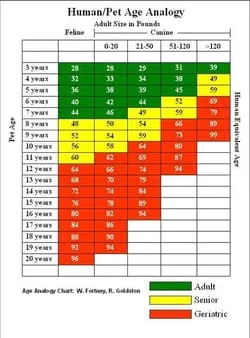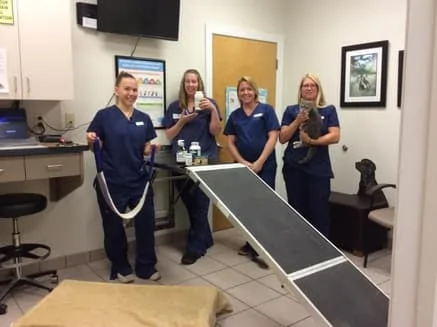Feline Physical Exam
Your cat’s examination starts with a look at the eyes to make sure they are clear with no cataracts or vision changes. Then we will look in the ear canals to check for any wax, ear mites, and signs of an ear infection or other problems. We will examine your cat’s teeth taking note of any tartar, periodontal disease or cavity-type lesions known as resorptive lesions. We will listen to your cat’s heart and lungs to check for any heart murmurs, abnormal rhythms or changes to lung sounds. Your cat’s abdomen will be palpated to check for any pain, masses or enlarged organs. We will check your cat’s skin and coat for any fleas,
signs of skin infection or hair loss, or dry skin. We will also assess your cat’s weight and body condition and feel his or her lymph nodes. We will also request that you bring a fresh stool sample so we can check for intestinal parasites. One thing we will not do is take your cat’s temperature unless he or she is ill. Recent studies show that cat’s become more stressed at the veterinary office if their temperature is taken. For an otherwise healthy cat, this is undue stress, so we no longer perform a temperature check on healthy cats and kittens. Though the physical exam takes only a few minutes to perform, it is a very thorough and important part of any preventive care visit with your cat. Please make sure to bring your cat to see us at least once a year to make sure he or she stays as healthy as possible.
Senior
A cat over the age of 7 is considered a “senior” patient at the Patton Veterinary Hospital and it is recommended that your feline friend visit us every 6 months. A senior cat’s health can change rapidly as they age about 7 times faster than humans. Having your feline examined every 6 months will help in preventing disease and catching any senior health changes early. Your cat will have a full wellness examination and blood work, radiographs, blood pressure and other diagnostics may be recommended at this time. Age Conversion

Did you know that 90% of senior felines have arthritis? Cats are notoriously good at hiding their pain and discomfort and many times their signals are so subtle it is difficult to pick up on. Arthritis and mobility changes are just one of the aspects that will be covered during your cat’s wellness examination.
Routine blood work is important in detecting early onset underlying health issues such as diabetes, hyperthyroidism and kidney and liver diseases. PVH offers blood work packages for the senior cat that includes a pet wellness report that you complete online and submit to our doctors. Additional diagnostics, such as x-rays, blood pressure readings and ultrasound examinations may also be recommended. This will give our doctors a full, comprehensive look at your feline friend – on the outside and to see what’s going on inside! – to make sure that your cat is healthy and happy.
For more information on caring for your older cat click here.
Behavior changes in aging pets
As pets get older, they may develop new, undesirable behaviors. Causes of these behaviors include changes in your household, new stressors, or the effects of disease and aging on virtually any organ of the body, including the brain. In fact, even subtle behavior changes in eating, elimination habits, sleep habits, and activity levels might be the first signs of an emerging health problem.
For more information on behavior changes
MEET OUR SENIOR WELLNESS COMMITTEE (Sassy Seniors)

This committee is dedicated to enhancing the service and visits for all senior pets to the Patton Veterinary Hospital.


